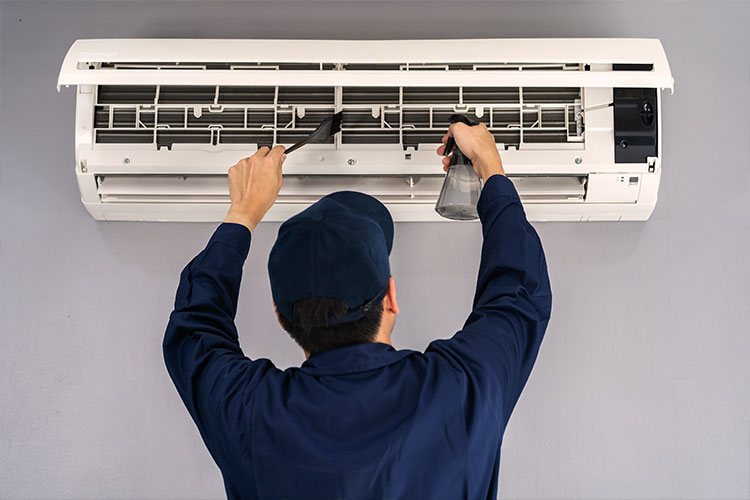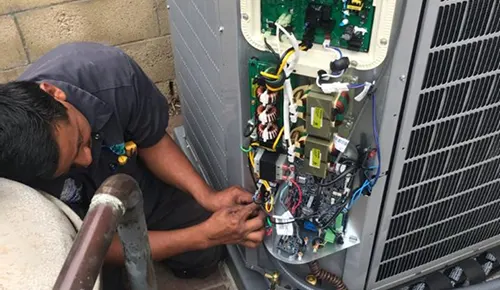Ac Air Conditioner Repair for Dummies
Ac Air Conditioner Repair for Dummies
Blog Article
Air Conditioning A/c Unit Repair: Professional Cooling System Remediation Guarantees Your Home Stays Comfy During The Hottest Days

Common A/c Problems
Have you ever felt that sudden rush of warm air just when you anticipated a cool breeze? It's frustrating, isn't it? Lots of property owners face this dilemma, frequently unaware of what prowls underneath the surface area of their cooling system. Let's unravel the mystery behind some of the most regular issues that demand timely a/c repair work.
Why Will Not My A/c Cool Correctly?
When your air conditioner system blows lukewarm air instead of a refreshing chill, it's a clear sign something's off. A clogged filter or low refrigerant levels typically play the bad guy here. Imagine attempting to breathe through a headscarf on a hot day-- that's what a filthy filter does to your system. Ever wondered why your energy bills spike when the cooling drops? That's your a/c struggling more difficult to make up for ineffectiveness.
Unusual Noises and What They Mean
Clicking, buzzing, or rattling noises aren't just noises-- they're sobs for assistance. A loose belt or a stopping working motor might be the offenders. One homeowner recounted how a consistent grinding sound turned out to be a worn-out compressor, conserving them from a total breakdown by acting rapidly.
Common Concerns at a Look
| Symptom | Likely Cause | Quick Fix |
|---|---|---|
| Warm Air | Low refrigerant or unclean filter | Replace filter, check refrigerant levels |
| Water Leakages | Blocked drain line or frozen coils | Clear drain line, thaw coils |
| Uncommon Noises | Loose parts or motor issues | Tighten up parts, inspect motor |
Is Your AC Cycling On and Off?
Brief cycling is more than an inconvenience; it can significantly reduce your system's life-span. This could signal an extra-large unit or a thermostat problem. Have you discovered your system turning on and off like a flickering light? Do not neglect it. It's a subtle hint urging you to contact the professionals before it turns into a pricey disaster.
- Unclean filters and coils trigger airflow problems.
- Thermostat breakdowns cause irregular temperatures.
- Electrical issues can stop your air conditioner from beginning.
Essential Tools for Air Conditioning Repair Work
Ever stood in front of a vast a/c unit questioning which tool will unlock the secret? The right instruments can make all the difference in between a quick repair and an unlimited afternoon of frustration. A digital manifold gauge set isn't just an expensive device; it's the investigator's magnifying glass in the world of refrigerant pressure. Its precision helps pinpoint leaks or imbalances that a casual look might miss out on.
When handling stubborn or rusted parts, a quality tubing cutter is worth its weight in gold. It slices through copper pipelines easily, preventing damage that might result in pricey leaks. Have you ever attempted to flex copper tubing by hand only to wind up with kinks? Avoiding this requires specialized bending tools created to protect the pipe's stability.
Tools That Professionals Swear By
- Vacuum pump: Vital for eliminating moisture and air from the system before charging refrigerant, guaranteeing optimum efficiency.
- Drip detector: An essential for catching undetectable refrigerant leaks that can cause system inefficiency.
- Multimeter: Beyond measuring voltage, it's important for detecting electrical faults within the a/c's control system.
- Fin comb: A little yet mighty tool that straightens bent condenser fins, improving airflow and performance.
Pro Tips for Using Cooling Repair Work Tools
- Always validate your gauge readings versus maker specifications; even seasoned techs confirm to avoid pricey misdiagnoses.
- When using an air pump, guarantee all valves and tubes are airtight; a minor leakage can ruin the evacuation procedure.
- Tidy your fin comb routinely. Dust and grime can trigger it to snag, destructive fragile fins further.
In the heat of summer, a malfunctioning compressor or stopped up filter can feel like a ticking time bomb. Armed with the right tools and know-how, the repair becomes less of an experience and more of a satisfying puzzle resolved. Isn't it curious how a well-calibrated gauge or a basic leakage detector can change the entire result?
Step-by-Step Repair Process
Ever seen how your air conditioning system starts to sputter, barely whispering the cool breeze it when delivered? The very first relocation is an extensive medical diagnosis-- because thinking only wastes time and resources. You might start by examining the thermostat settings, however sometimes the real culprit lurks deeper.
1. Initial Examination and Diagnostic
Begin by powering off the system to avoid shocks. Open the access panels and visually inspect for scorched wires, blocked filters, or ice accumulation. A common oversight is overlooking the condenser coils; dust and dirt here can choke performance. Use a multimeter to test electrical parts and verify if the compressor is receiving power.
2. Identifying Refrigerant Issues
Does the unit blow warm air? That's typically a sign of low refrigerant levels or leakages. Specialists use a manifold gauge set to determine pressure properly. Keep in mind, overcharging or undercharging the system can cause irreparable damage-- exact measurement is crucial.
3. Cleaning Up and Element Replacement
Sometimes, an easy coil cleaning restores the system. Other times, it read more requires swapping out capacitors, contactors, or fan motors. Changing these parts involves cautious disassembly and reassembly; skipping steps can cause additional breakdowns.
4. System Testing and Calibration
Once repairs are made, switch the unit back on and observe its behavior. Procedure the temperature level drop throughout the evaporator coil-- it needs to be approximately 15-20 ° F. If not, recalibrate the thermostat or look for airflow blockages.
Professional Tips
- Prevent running the compressor without refrigerant-- this burns out the motor rapidly.
- Utilize a UV color to track down evasive leakages; they're frequently concealed in hard-to-reach areas.
- Never ever overlook the drain line-- blockages here can cause water damage and system failure.
- Use insulated gloves when dealing with capacitors; they retain charge and can deliver a nasty shock.
Defending Against Sudden Breakdowns
Have you ever wondered why your air conditioning unit sputters to a stop right at the peak of summertime? The reality is, neglecting routine upkeep often invites unexpected failures. Dust, debris, and worn-out elements wage a quiet war inside your unit. Preventive maintenance is the secret weapon-- capturing minor problems before they spiral out of control.
Professional Tips for Keeping Your A/c in Top Forming
Best Air Conditioning Services Jacksonville FLAir Conditioning Installers Jacksonville FL
What Is The Best Heating And Air Conditioning Jacksonville FL
Air Conditioning Repair Near Me Jacksonville FL
Heat Air Conditioning Repair Jacksonville FL
- Tidy or change filters regular monthly: A blocked filter chokes air flow, requiring the system to work overtime and speeding up wear.
- Examine coil fins: Bent fins limit airway, just like a traffic jam in your cooling system. Use a fin comb to straighten them thoroughly.
- Inspect refrigerant levels: Low refrigerant can cause the compressor to overheat, a precursor to pricey repair work.
- Clear the condensate drain: Obstructions here can result in water damage and mold development, a covert culprit behind remaining smells.
- Examine electrical connections: Loose circuitry or rusty terminals often spark periodic failures, a subtle indication.

When Was the Last Time You Listened to Your AC?
That faint rattling or unusual hum may seem insignificant, however it's a precursor to larger mechanical troubles. One summer, a customer mentioned a soft buzzing sound. A quick evaluation exposed a loose fan blade-- easy to fix, yet left unattended, it could have shattered the motor. Moments like these underscore the worth of regular checks.
Quick List for Seasonal Prep
| Action | Frequency | Why It Matters |
|---|---|---|
| Filter cleaning/replacement | Every 1 month | Maintains air flow and performance |
| Coil and fin assessment | Twice a year | Avoids airflow restrictions |
| Refrigerant level check | Annually | Ensures correct cooling capability |
| Drain pipes line cleaning | Every 6 months | Avoids water damage and mold |
| Electrical system evaluation | Yearly | Avoids abrupt shutdowns |
Pro Pointer: Beyond the Fundamentals
Did you know that lightly lubricating the fan motor bearings annually can extend their lifespan? It's a detail typically overlooked but crucial. Likewise, shading your outside system from direct sunshine can lower the compressor's work, discreetly improving longevity. Keep in mind, the health of your air conditioning system is a reflection of the attention you offer it before it shrieks for help.
Report this page